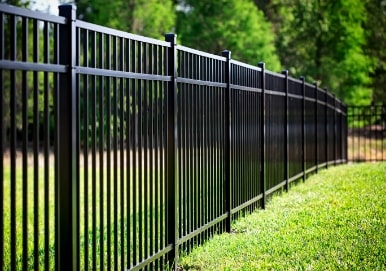When it comes to enhancing your property’s appeal, homeowners often consider various renovations and upgrades. Among these, installing a fence is a popular choice. But does a fence really impact property value? This blog post delves into the relationship between fencing and property value, exploring the different types of fences, their benefits, and how they can affect the overall worth of your home.
How Fencing Affects Property Value
Fencing can have both positive and negative impacts on property value, depending on several factors such as the type of fence, its condition, and the location of the property. Here’s a closer look at how fencing can influence the value of your home.
1. Privacy and Security
One of the primary reasons homeowners install fences is to enhance privacy and security. A well-built fence can provide a sense of safety, particularly in urban areas or neighborhoods with close-set homes. Properties with privacy features like fences tend to attract more buyers, especially those with families or pets. In such cases, a fence can add to the perceived value of a property.
2. Curb Appeal
Curb appeal plays a significant role in real estate. The first impression a property makes can greatly affect its marketability. A stylish, well-maintained fence can enhance the visual appeal of a home, potentially increasing its value. However, it’s important to choose a fence style that complements the architecture of the house and the aesthetic of the neighborhood. A mismatched or poorly constructed fence could detract from curb appeal, thereby lowering property value.
3. Property Boundaries
Fencing also serves a functional purpose by clearly defining property boundaries. This can be particularly important in suburban and rural areas where large plots of land are common. A well-defined property line can prevent disputes with neighbors and give potential buyers peace of mind, which can be a selling point and may enhance the property’s value.
Types of Fences and Their Impact on Property Value
Not all fences have the same effect on property value. The type of fence you choose can make a significant difference in how it is perceived by potential buyers. For further information, check our previous post on top reasons to invest in Aluminum Fencing. Below are some common types of fences and their potential impact:
Wooden Fences
Wooden fences are a popular choice for many homeowners because of their natural appearance and versatility. They can be painted or stained to match the home’s exterior and offer a high degree of privacy. However, wooden fences require regular maintenance to prevent rot and insect damage. A well-maintained wooden fence can add to property value, while a neglected one can do the opposite.
Vinyl Fences
Vinyl fences are known for their durability and low maintenance. Unlike wooden fences, they do not require painting or staining and are resistant to pests and rot. Vinyl fences can provide a clean, modern look that appeals to many buyers, potentially increasing property value. However, the initial installation cost can be higher than that of wood or chain-link fences.
Chain-Link Fences
Chain-link fences are one of the most affordable options available, but they offer little in terms of privacy or aesthetic appeal. While they are durable and require minimal maintenance, they are often perceived as less attractive, particularly in residential areas. A chain-link fence might not add much to the property value and could even detract from it in neighborhoods where aesthetics are a priority.
Factors to Consider Before Installing a Fence
Before installing a fence, consider the following factors to ensure it positively impacts your property value:
- Neighborhood Standards: Research the types of fences commonly found in your neighborhood. Installing a fence that aligns with local trends and standards is more likely to enhance property value.
- Local Regulations: Check local building codes and homeowners association rules to ensure your fence complies with regulations. Non-compliance can lead to fines or the removal of the fence, negatively affecting property value.
- Purpose of the Fence: Understand the primary purpose of your fence. Is it for privacy, security, or aesthetic purposes? Choose a fence type that meets your specific needs while also considering potential buyers’ preferences.
Conclusion: Does Fencing Really Matter for Property Value?
Ultimately, the impact of fencing depends on various factors, including the type of fence, its condition, and the preferences of potential buyers. A well-chosen and maintained fence can add value by improving privacy, security, and curb appeal. However, an unsuitable or poorly maintained fence can have the opposite effect.
When considering installing a fence, think carefully about your goals, budget, and local market trends. For more insights on increasing your property value, check out Zillow’s guide on home improvements that add value to your home.





